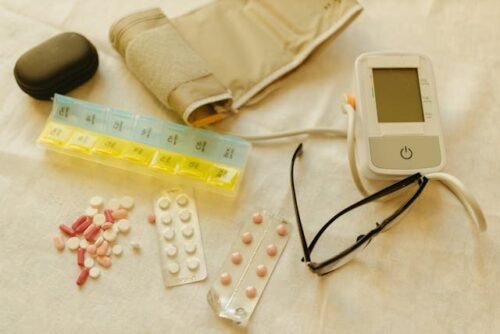Caring for an elderly loved one with dementia comes with numerous challenges, and ensuring they take their medication correctly. Understandably this particular care task is incredibly challenging. The risks associated with medication errors, such as overdoses or missed doses, are significant. An event of simple forgetfulness can quickly lead to dangerous situations. After reviewing real experiences from caregivers, we’ve outlined the key issues and practical solutions to address them. We believe this post is eye-opening for most of you and directly involved in enhancing dementia care at home.
The Problems
Dangerous Forgetfulness
Many dementia patients genuinely forget if they’ve taken their pills, which can lead to accidental overdoses or missed doses. One caregiver shared a heartbreaking story of her husband, who passed away after overdosing because he kept forgetting he had already taken his medication.
Living Alone Increases Risk
Mistakes are far more likely to happen when no one is present to monitor medication intake. Phone calls and alarms can be ineffective, as memory lapses often erase reminders the moment they end. It is crucial to implement reliable systems to ensure proper medication management.
Resistance or Denial
Elderly individuals often mistakenly believe they don’t need their medications, especially when the benefits aren’t immediately apparent. This misunderstanding frequently arises from a strong sense of pride, which can prevent them from seeking the help they need, or from feelings of fear and confusion that cloud their judgment. Recognizing the crucial role that medications play in their health is essential for their well-being, and it’s important for them to embrace this support rather than resist it.
Changing Needs and Disease Progression
Dementia is a progressive condition that gradually impairs cognitive function. Strategies that are effective today, such as using pill boxes or setting reminders, may no longer be sufficient as the disease advances. This unpredictability highlights the importance of long-term planning and adaptability in providing care for individuals with dementia at home. By anticipating their changing needs and remaining flexible in our approaches, we can create a supportive environment that enhances their quality of life.
The Solutions That Work (and Sometimes Don’t)
Weekly Pill Organizers (Pill Boxes)
 Many caregivers strongly recommend using pill containers clearly labelled with the days of the week and times (morning/evening). This method is highly effective for patients who can still recognize the day and recall their medications. However, it’s important to note that for individuals experiencing more advanced memory loss, relying solely on this approach can be problematic.
Many caregivers strongly recommend using pill containers clearly labelled with the days of the week and times (morning/evening). This method is highly effective for patients who can still recognize the day and recall their medications. However, it’s important to note that for individuals experiencing more advanced memory loss, relying solely on this approach can be problematic.
Centralized Medication Management
A responsible caregiver kept all prescription bottles secured at home and took charge of the weekly refilling of pill boxes. This strategic approach ensured that dementia patients had limited access to their medications, effectively minimizing the risk of overdose and safeguarding their health.
Physical Presence Matters
 Caregivers consistently emphasized the critical need for in-person presence when administering or supervising medication for individuals in advanced stages of dementia. They noted that the complexities of this condition often render remote solutions—like alarms or phone calls—largely ineffective. The personal touch, reassurance, and direct oversight provided by caregivers play a vital role in ensuring the safety and well-being of those they care for, as these individuals may struggle to respond to reminders or cues from technology.
Caregivers consistently emphasized the critical need for in-person presence when administering or supervising medication for individuals in advanced stages of dementia. They noted that the complexities of this condition often render remote solutions—like alarms or phone calls—largely ineffective. The personal touch, reassurance, and direct oversight provided by caregivers play a vital role in ensuring the safety and well-being of those they care for, as these individuals may struggle to respond to reminders or cues from technology.
Labeling and Visual Cues
To effectively support individuals in the early stages of dementia, it is essential to store medications in clear containers and place them in highly visible areas, such as the breakfast table. This approach significantly increases the likelihood that they will remember to take their medications independently, promoting both safety and autonomy.
Pharmacy Pre-Packaged Meds
Many pharmacies now offer a convenient service where medications are carefully sorted and packaged into individualized packets, each clearly labelled with the date and time for when they should be taken. This thoughtful organization not only helps to minimize confusion but also streamlines the medication administration process. When paired with timely reminders, this system can further enhance adherence, ensuring that patients can manage their medications with ease and confidence.
Digital Screen Chat
Consider installing a digital screen, such as an Alexa or Google device, that can initiate friendly conversations and provide gentle reminders for medication. This engaging interaction not only helps keep patients on track with their medication schedules but also creates a sense of companionship, alleviating feelings of isolation. By fostering this connection, patients are encouraged to stay motivated and actively participate in their daily tasks, enhancing their overall well-being.
Professional Help or Facility Care
Many families eventually reach the point where home care isn’t enough. Memory care facilities offer structured environments where trained staff ensure medication is taken safely. One caregiver shared that her mother, who once dreaded the idea, thrived in a memory care community.
“Get trusted advice on dementia care at home and practical tips for caring for someone with dementia at home—all in one place.”
The Takeaway
Helping a dementia patient take their medications safely is not a one-size-fits-all solution. It depends on the person’s level of memory loss, their willingness to accept help, and whether they live alone or not. But here’s what you can do:
- Start with a pill organizer if memory lapses are minor.
- Take over medication management if safety becomes a concern.
- Be ready to adapt — what works today might not work next week.
- Don’t hesitate to seek professional help if home care becomes unsafe.
Caring for a loved one with dementia presents a profound challenge, weaving together emotional, physical, and logistical demands. Among the myriad responsibilities, managing medications stands out as a crucial piece of the intricate puzzle. It’s essential to practice patience not only with your loved one, who may be navigating the fog of confusion and memory loss but also with yourself as you tackle the many stresses of caregiving. Remember, seeking assistance from others is not a sign of weakness; rather, it’s an integral part of maximizing care and ensuring both you and your loved one receive the support you need to navigate this journey together.
“Get trusted advice on dementia care at home and practical tips for caring for someone with dementia at home—all in one place.”

